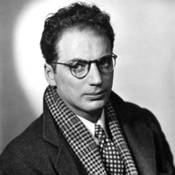
By Stage Publishing Company, Inc. attributed to Alfredo Valente - Public Domain
Clifford Odets
Playwright
Biography
Clifford Odets
Clifford Odets is regarded as one of the greatest American playwrights of the 20th-century. In the 1930s, Odets socially-aware dramas were the most influential and popular produced. His works, including Waiting for Lefty, Awake and Sing!, and Golden Boy, are classics of the contemporary stage.
Odets was born in Philadelphia in 1906 to Russian- and Romanian-Jewish parents and raised in the Bronx, New York City. He attended two years of high school before dropping out to pursue his career in theatre. As a young actor, Odets performed in shows in Greenwich Village and the Lower East Side, toured with stock companies, and taught dramatics at Jewish summer camps in the Catskills and Poconos. He was heavily influenced by the work of Irish-playwright Sean O'Casey, whose play, Juno and the Peacock, he saw on Broadway.
Odets became a member of the Group Theatre in 1933 after meeting Harold Clurman. There, Odets collaborated with some of the most influential theatre figures of the century, including Clurman, Stella Adler, Sanford Meisner, Elia Kazan, and Lee Strasberg, as they developed the acting theories of Constantin Stanislavski. Clurman encouraged Odets to try his hand at playwright, and his early efforts were developed and staged by members of the company.
Odets' first play to be produced was the one-act Waiting for Lefty. It was opened at the Civic Repertory Theatre on January 5, 1935, and became a surprise, worldwide success. Odets was suddenly catapulted to international renown, though many countries banned Waiting for Lefty for its socialist undertones. His next play, Awake and Sing!, was produced by the Group Theatre on Broadway in February 1935. The play was also a wild success, and is considered Odets' masterpiece. Awake and Sing! further set Odets apart from any of his contemporaries, with its focus on the struggles of the working class and its focus on a Jewish family.
Odets works' continued to focus on the economic hardships faced by the working class affected by the Great Depression, and his critics accused of him of producing leftist propaganda. Nevertheless, he remained wildly popular. Golden Boy, produced by the Group Theatre in 1937, became the company's biggest commercial success.
His writing began to shift from social commentaries to studies on characters, relationships, and moral dilemmas, as evidenced by his next play, Rocket to the Moon. He was accused by leftist critics of abandoning his former political stance, but the play still enjoyed moderate success. His next two plays, Night Music and Clash By Night, proved less successful still. He began writing screenplays for Hollywood, including the acclaimed film None but the Lonely Heart in 1944, which he both wrote and directed. Odets did not return to Broadway until 1950. The Country Girl was a critical and commercial success. It was followed by The Flowering Peach, Odets' final play, which was opened in 1954. The play was highly acclaimed and nominated for a Pulitzer Prize (losing to Tennessee Williams' Cat on a Hot Tin Roof).
Odets' career was heavily impeded by the House Committee on Un-American Activities. Odets had belonged to the Communist Party for less than a year in 1934-35, but, as he was seen as a promoter of leftist ideals, he was placed under investigation in October 1947. He was subpoenaed to testify before the Committee in April and May 1952. Though he complied with all their questions and even named names (carefully making sure they were ones that had already been named in other testimonies, thus betraying no one), the Committee considered him an uncooperative witness. Though he was not overtly blacklisted, he was not thanked by the Committee, a gesture which was nonetheless damning. Odets' faced massive backlash publicly and struggled to find work.
Clifford Odets passed away on July 23, 1963 from stomach cancer. During his illness, he received visits from such artists and friends as Marlon Brando, Jean Renoir, Shirley MacLaine, Danny Kaye, and his old associates from the Group Theatre.
Clifford Odets is a member of the American Theater Hall of Fame. His work has inspired innumerable playwrights, including Arthur Miller, Paddy Chayefsky, Neil Simon, David Mamet, and Jon Robin Baitz. His works continue to be some of the most revived in America and internationally.
Known For
Shows
Shows associated with Clifford Odets
Monologues
Monologues from shows associated with Clifford Odets
Scenes
Scenes from shows associated with Clifford Odets
Videos
Videos associated with Clifford Odets
Quizzes
Quizzes associated with Clifford Odets
Learning Modules
Learning modules associated with Clifford Odets
Additional Information
Broadway's Dreamers: The Legacy of the Group Theatre: a documentary on the foundation, success, and influence of the Group Theatre